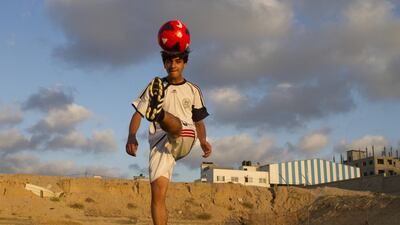With the proliferation of social media, the world has never been more aware of the realities of life under Israeli occupation.
While the mainstream media remains stubbornly wedded to Israel’s security narrative of the conflict, more people now understand that the situation is about rights and not just security. The next chapter in this drawn-out political struggle is likely to take place on the football pitch, not on the battlefield.
The Palestinian Football Authority’s (PFA) proposal to have Israel banned as a Fifa member country will have ramifications for Israel far beyond the pitch. Jibril Rajoub, the head of the PFA, is pushing forward with the proposal because he says the Israeli occupation hampers his team’s ability to train and play.
Due to myriad travel restrictions put in place by the Israeli military, Palestinian footballers are unable to travel between the Gaza Strip and the occupied West Bank. Given the network of checkpoints, footballers have difficulty even getting to matches or training within the West Bank.
Star footballers like Mahmoud Sarsak have been detained on trumped-up charges of membership in militant organisations. Sarsak was released from prison, without charge, only after a 97-day hunger strike.
________________________________________
Read more about the racism in Israeli sport:
■ Israeli football, racism and politics: The ugly side of the beautiful game
■ As South Africa proved, sporting boycotts work
________________________________________
Mr Rajoub summed it up well when he said that Palestine “cannot compete because the politics of the Israeli occupation make developing football a near impossibility”.
Israel and its supporters are quick to say that football and politics should be separate, but the fact is that Israel’s occupation directly affects the livelihoods of Palestinians, including footballers.
While Fifa is far from the ideal candidate to expose the horrors of the Israeli occupation, football is one language that can transcend boundaries. Debate about the hardships facing the PFA exposes millions of people to the Israeli-Palestinian conflict in a way that leaves Israel’s well-oiled PR machine on the back foot. It is no surprise, then, that Israeli football association chairman Ofer Eini is desperately attempting to remove the proposal from Fifa’s agenda.
The PFA needs 75 per cent of Fifa’s 209 global associations to approve its proposal to suspend Israel from all its international activities, including Uefa competition. While that number appears unlikely in the vote this month, it is instructive to recall that Israel gained membership to Uefa only in the mid-1990s, and its acceptance was largely contingent on the Oslo Accords with the Palestinians.
Put simply, a football boycott is low-hanging fruit for the global boycott, divestment and sanctions (BDS) movement. The boycott of apartheid South Africa’s sports teams, in particular the rugby team, proved extraordinarily successful in isolating the apartheid regime.
While sport doesn’t hold nearly the same sway in Israel, the country is deeply concerned about its cultural connections with the West, especially with Europe.
Last month, the Israeli High Court upheld a draconian law that makes calling for a boycott a civil offence. If any Israeli citizen calls for a boycott of any Israeli entity – on both sides of the Green Line – they can be held financially responsible for any damages incurred by the boycott.
By South African anti-apartheid standards, the BDS movement is still in its infancy. South African activists worked for nearly three decades to achieve an overarching sports boycott. The global BDS movement only began in 2005 but has already found that football’s highest body is debating a boycott.
While Israel might not be the strongest footballing nation, isolation is the country’s Achilles heel. Given Tel Aviv’s contempt for universal democratic norms, as evidenced by the complexion of the new Israeli government along with the entrenchment of the status quo in the West Bank, an Israeli sports boycott is not a remote possibility but could soon be a concrete reality.
jdana@thenational.ae
On Twitter: @ibnezra

